When the search for answers turns into friendship
How likely is it that the paths of two Humboldt Fellows from India – a country home to almost 1.5 billion people – will cross because their children attend the same daycare facility in Germany? Assuming one of them is a top-class legal expert, the other an outstanding nuclear physicist: What are the chances that a unique friendship will develop out of a chance encounter during daycare pickup time? And where in the world would such an encounter take place?
While a detailed statistical analysis and evaluation of the first two questions exceeds the scope of this article, the answer to the last is simple: the meeting was made possible by Goethe University Frankfurt. It is worthwhile recalling that this is just one of many encounters that can and do take place on the university campuses located throughout the European metropolis, with the New Year’s reception for international academics offering a glimpse at the internationality encountered here day in, day out. This year’s event, held at the beginning of February, brought together more than 80 participants, including children, from 26 different nationalities. From PhD students to visiting professors, various scholarship holders, from short-term to long-term teachers and lecturers, from newcomers to “old hands”: it was a truly diverse community of academics that gathered in the guest house in Frauenlobstraße, run by the Foundation for the Promotion of International Academic Relations at Goethe University, on this evening, which was accompanied by piano music from Frankfurt jazz pianist Philip Wibbing.
The biggest eyes probably belonged to two five-year-old boys who patiently listened to the welcoming words of Prof. Dr. Jürgen Bereiter-Hahn, chairman of the foundation’s board of trustees, University President Prof. Dr. Enrico Schleiff, and the opening piano piece by Dr. Johannes Müller, head of the Global Office.
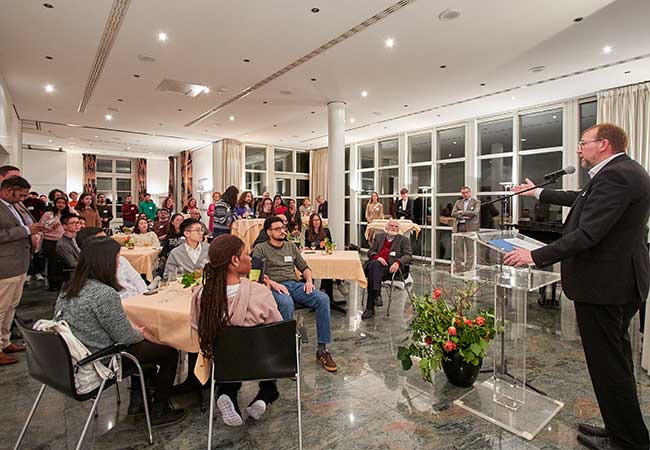
In his speech, Schleiff emphasized the formative nature of intercultural and international gatherings of this kind, even for the youngest participants: “Internationality is so important for us precisely because you, as visiting academics and international students, bring with you new ideas, new impetus, new points of discussion and new ways of arguing. And in current times, it is more important than ever that we all work together to create a new and beautiful future for our world.” He pointed out that just a few days earlier, tens of thousands of people had demonstrated in Frankfurt for democracy, freedom and diversity as part of the Germany-wide, largely grassroot campaigns against racism and anti-Semitism, to which Goethe University and other Frankfurt-based partners had also lent their support, and in this context emphasized once again that freedom is the highest good of science.
All about Humboldt, nuclear physics and law
The future of their children, home countries and fields of research are also on the minds of the two Humboldt Fellows from India. Sahila Chopra, nuclear physicist at the Frankfurt Institute for Advanced Studies (FIAS) and member of Prof. Dr. Dr. Horst Stöcker’s working group, rates her one-and-a-half years of experience at Goethe University to date with 100 out of 100 points. “This scholarship has been a dream come true for me. Not only because I was lucky enough to be the only one out of 35 students in my cohort to receive this coveted funding. But also because I really appreciate this university and this city, and the helpfulness of so many people – prime among them my host Prof. Stöcker.” Once her scholarship ends in November this year, she plans to return to India with her family. Her aim is to pass on what she has learned to students in her home country, to share her experiences and help broaden horizons.
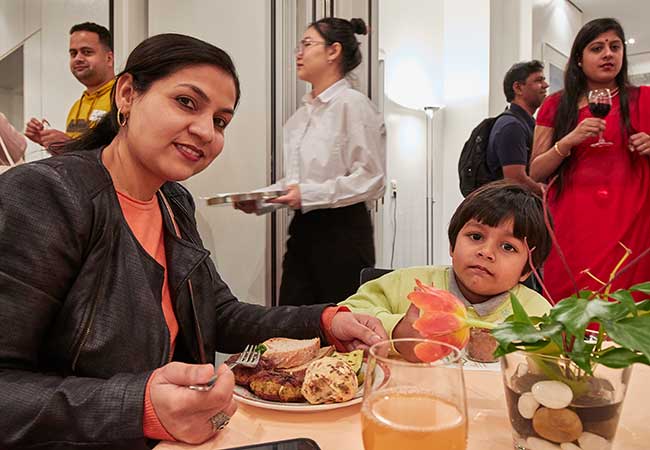
She will be taking a new friendship home with her, too – one that her son started at Goethe University’s daycare center, and which has since spread to the parents, one of whom coincidentally is another Humboldt Fellow from India. “We would never have met in our home country. Not only do we come from different regions and cultures, we also have completely different academic backgrounds,” says Chopra about Dr. Kumar Pratyush, who has spent the last one and a half years at the faculty of law.
Pratyush is fascinated by continental law and, in addition to his home country, already lived and studied in the USA and Italy before coming to Germany. His wife is also making the most of their stay in Frankfurt to not only learn German but also complete an MA at Goethe University, in the same field as her husband. Like Chopra, Pratyush also appreciates the German academic world that his host Prof. Dr. Dr. Gunther Teubner, among others, has helped make accessible for him. Referring to a profound sense of Wanderlust, he says that he does not yet know if or when he will return to India. Yet, even if his next stop is still uncertain, his scientific goal is far from: “My dream is to be called upon as an expert in future discussions on German law – including by German experts.” A small and modest goal, he adds with a wink, adding that, “especially in academia, we need to learn from each other, celebrate our differences, and uphold and strengthen each other.”
Promoting young talent, giving exiled academics a new home
Xin Yin is sharing a table with other young researchers that evening. The PhD student from China has been studying at Goethe University Frankfurt for three years. Her area of specialty: Immanuel Kant. “I’m currently writing my dissertation,” she says. Mind you: in German, a language she largely taught herself.
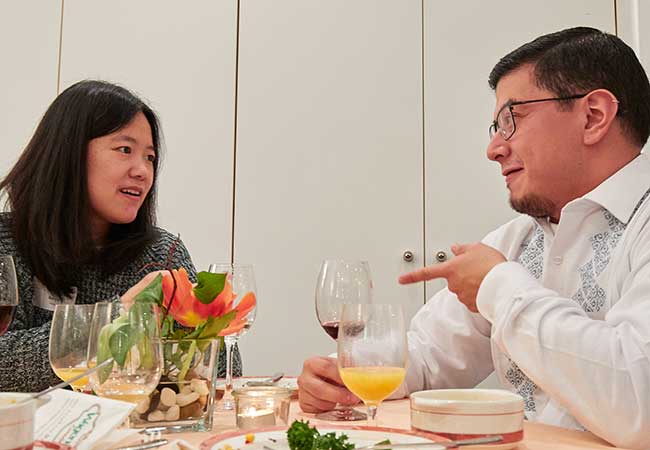
Sitting at the table with her is Humberto Sanchez from Mexico. He only arrived in Frankfurt two weeks ago, and will be writing his PhD in musicology over the next four years with funding from the Mexican government. “I still have to settle in,” he says, “but so far I can’t complain.”
Table-mate Xian Yaolong is also researching his PhD at Goethe University, more precisely at the PRIF Peach Research Institute Frankfurt. Like Yin, he comes from China and, like her, he also studied in Guangzhou. He focuses on forms of government and legitimacy of rebel organizations, with an emphasis on Myanmar, which he wants to visit as part of a research trip next year. “I want to incorporate interviews into my research. Given that trust plays a particularly important role in conflict regions, it’s essential for that to be on the ground.”
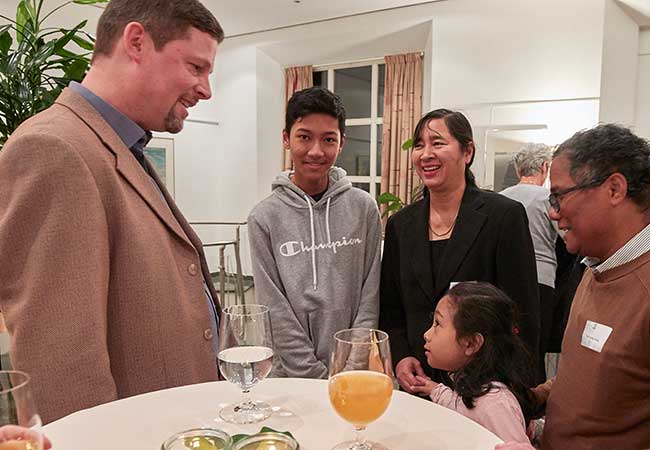
Prof. Dr. Aung Aung, a postdoctoral researcher at the Department of Tropical Medicine and Global Health, is no longer in Myanmar. The exiled scientist has been living in Germany since 2020, and his children attend the local school. Aung recently took part in the exhibition “Poser pour la liberté/Standing for Academic Freedom”, held at Goethe University Frankfurt. He and his family have integrated well into German society: after a year of special tuition, his son is now following the regular ninth-grade curriculum, while his wife continues to attend German courses. Whether and when the trained veterinarian will be able to return to his home country is uncertain – he is on the military regime’s blacklist. Read more about Prof. Dr. Aung Aung here (in German): https://tinygu.de/JCkv3
Like Aung, Dr. Olena Podvorna has also found a new home at Goethe University. Born in Ukraine, she fled to Germany after the Russian war of aggression, where she initially took up a scholarship at Freie Universität Berlin. With the war now entering its third year, she decided to continue her academic career in Germany and today works as project manager and senior researcher at PRIF. “For me there is no better environment, the atmosphere is great, the people are very helpful, open and warm, and it is so much more multicultural here than in Berlin. Now that I work at PRIF, I look forward to each new day at the office. My colleagues have already asked me if I actually plan to take a vacation,” she says with a laugh. In the upcoming semester, she will be teaching a course at a German university for the first time. “Although there were a few bureaucratic hurdles, thanks to all the support I received, I managed to overcome those, too.” Before receiving the job offer here in Frankfurt, Podvorna already had received similar offers from the UK and the US. “Looking back, I can say it was the right decision.”
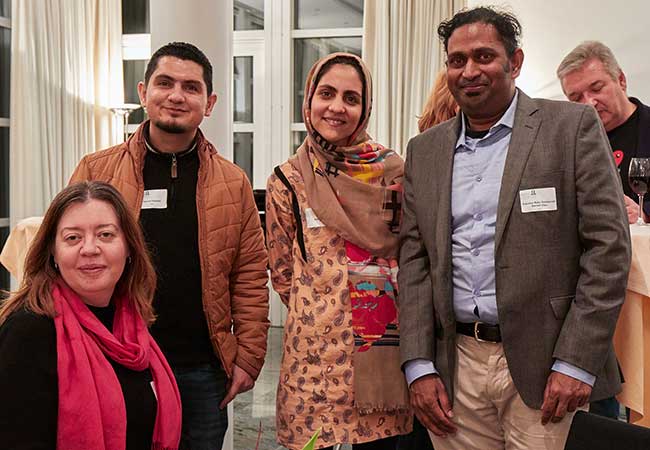
Complementary goals
Dr. Olgu Özdemir Ertürk only arrived in Germany a few days ago. Together with her husband, she will spend the next year here, conducting research in her field of specialty – employment law – at Goethe University’s Law Faculty under Prof. Dr. Bernd Waas. Her stay here is funded by the Turkish Science Committee. In Prof. Dr. Waas, she has found an expert in topics like algorithmic management and platforms such as Uber, which through the integration of AI regulate not only the working time management but also the deployment of their workforce. “The topic is also relevant for warehouses of large suppliers, where employees now wear small computers on their wrists that tell them where to store or pick goods. However, these devices also record how much time a process takes them – meaning their work is not only tracked, it is also evaluated.” The same applies to software solutions such as Microsoft Teams, which record exactly when an email was sent, or how long a person is supposedly “inactive” at their PC. “The Hessian Data Protection Act came into force in 1970, making it the world’s first and oldest. Against this background, I am all the more pleased to be able to do my work here.”
For whatever reasons the international academics present that evening found their way to Goethe University Frankfurt, the reception put a spotlight on the myriad of connections that underpin science, and illustrated the groundbreaking relationships these give rise to. This is exactly what Prof. Dr. Jürgen Bereiter-Hahn and Prof. Dr. Schleiff had hoped for when they welcomed the guests in saying that their individual goals complemented those of the university: to enable communication across borders, to advance knowledge and innovation, and to expose oneself to other professional environments. This, they added, not only applies to each international scholar coming to Frankfurt, but also to the university as their host.








